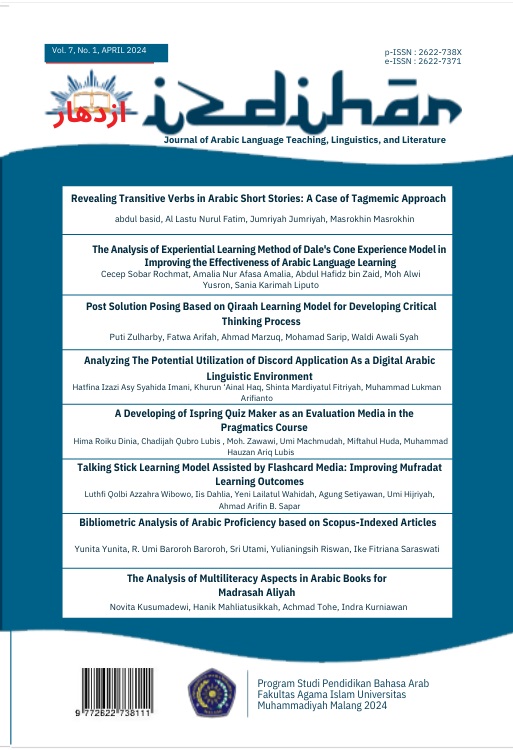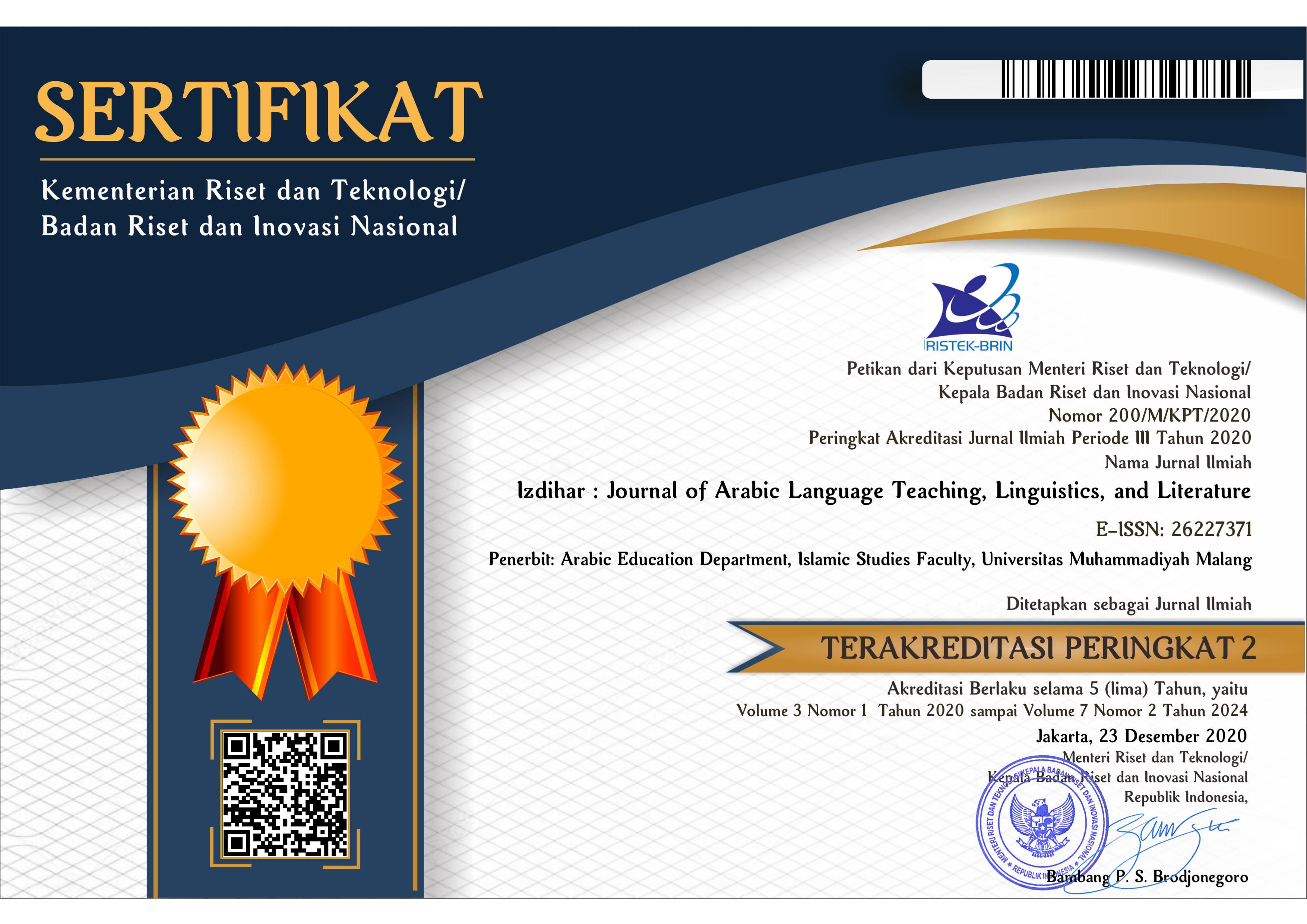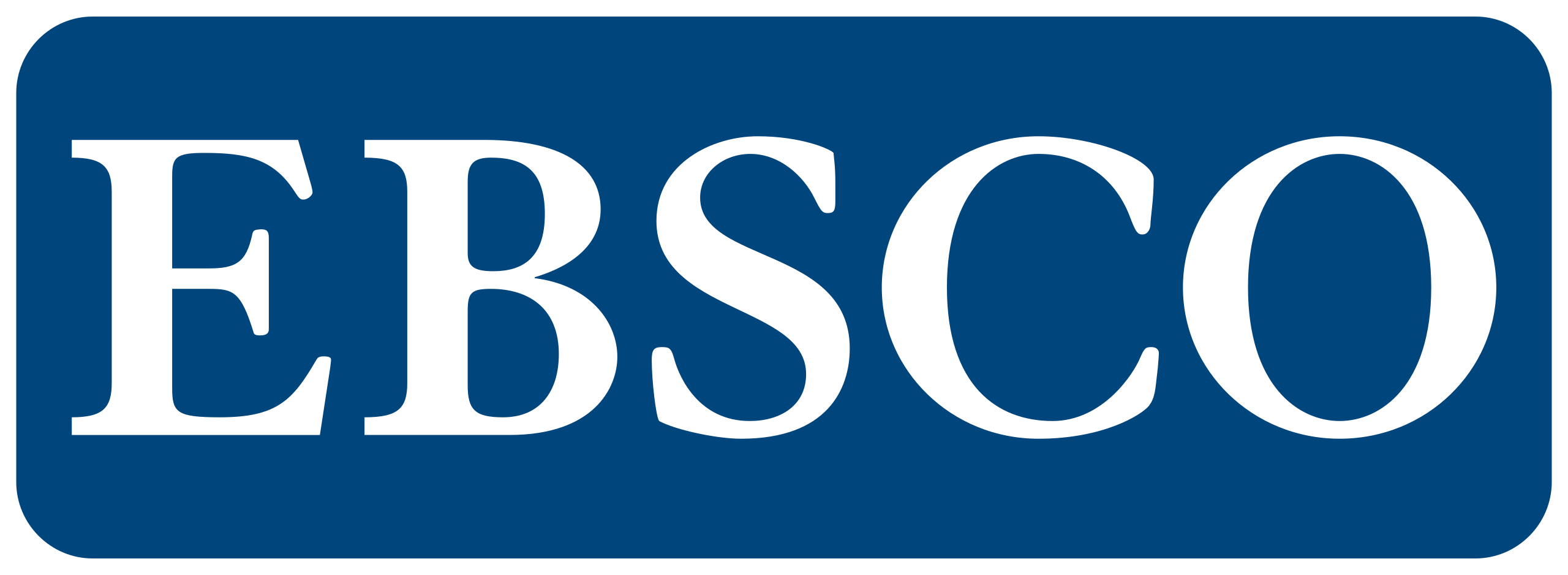The Analysis of Experiential Learning Method of Dale's Cone Experience Model in Improving the Effectiveness of Arabic Language Learning
DOI:
https://doi.org/10.22219/jiz.v7i1.30823Keywords:
Arabic learning effectiveness; Dale's Cone Experience; experiential learning; learning model; soft skillsAbstract
This study purposed to analyze the effectiveness of the Arabic language learning model based on Edgar Dale's cone of experience theory. The method used library research by taking books, journals, and documents. The result of this research is that Arabic language learning with an experiential learning model, according to Edgar Dale's cone of experience, is effective learning and can help to develop Arabic language learning that is focused and empowers students to master it. Learning Arabic through this model is also very effective for teaching Arabic as a means of communication. Experiential learning and Edgar Dale's cone of experience theory have a strong fit in the context of Arabic language learning. Dale's cone of experience theory illustrates different levels of student participation and involvement in learning, ranging from concrete experience to abstract conceptualization. According to Dale, direct and interactive experiences promote more effective learning, which is consistent with the experiential learning approach. In experiential Arabic learning, students engage in direct experience by speaking, listening, reading and writing in Arabic, which is the first step in the cone of experience.
Downloads
References
Agung, N. (2020). Peningkatan Kemampuan Debat Bahasa Arab Mahasiswa melalui Metode Suggestopedia. NASKHI, 2(1), 19–29. https://doi.org/https://doi.org/10.47435/naskhi.v2i1.288
Alsubhi, A., Mohamed Adnan, M. A. Bin, Yusof, A. bin, awae, F., & Abuhassna, H. (2023). Unlocking the Future of Arabic languages teaching: Exploring Communicative Language Teaching Methodology. International Journal of Academic Research in Business and Social Sciences, 13(10), 1603–1626. https://doi.org/10.6007/ijarbss/v13-i10/19015
Anggreni, A. (2020). Experential Learning (Pembelajaran Berbasis Mengalami). At-Thullab : Jurnal Pendidikan Guru Madrasah Ibtidaiyah, 1(2), 186. https://doi.org/10.30736/atl.v1i2.86
Badruddin, U. (2016). Bisa Bahasa Arab Bukan Hanya Mimpi. Tartil Institute.
Bintang, A., Pradana, A., & Fidian, A. (2017). Experiential Learning pada Pembelajaran Kosakata Bahasa Inggris. University Research Colloquium 2017, 1(1), 297–302. https://journal.unimma.ac.id/index.php/urecol/article/view/1605/721
Dalim, S. F., Azliza, N. Z. M., Ibrahim, N., Zulkipli, Z. A., & Yusof, M. M. M. (2019). Digital storytelling for 21st century learning: A study on pre-service teachers’ perception. Asian Journal of University Education, 15(3), 226–234. https://doi.org/10.24191/ajue.v15i3.7801
Elsherbiny, H. (n.d.). Drama in LCTL Classrooms: Example of an Experiential Learning Project in Modern Standard Arabic Hossam Elsherbiny University of Minnesota Twin Cities. University of Minnesota Twin Cities, 95–120.
Fatha Pringgar, R., & Sujatmiko, B. (2020). Penelitian Kepustakaan (Library Research) Modul Pembelajaran Berbasis Augmented Reality pada Pembelajaran Siswa. Jurnal IT-EDU, 05(01), 317–329. Retrieved from https://ejournal.unesa.ac.id/index.php/it-edu/article/view/37489
Fitri Sukmarini, Mauludiyah, L., Muhammad Ainur Roziqi, & Nurdianto, T. (2021). Interactive Arabic Learning Media based on Articulate Storyline 3 to Increase Students’ Motivation / Pemanfaatan Articulate Storyline 3 sebagai Media Pembelajaran Interaktif untuk meningkatkan Motivasi Belajar Bahasa Arab Siswa. Al Mahāra: Jurnal Pendidikan Bahasa Arab, 7(1), 106–121. https://doi.org/10.14421/almahara.2021.071-06
Hamdu, G., Aeni, N., & Saepulrohman, A. (2015). Pengembangan Media Pembelajaran Berbasis Masalah Tema Bermain dengan Benda-Benda di Sekitar. Jurnal Penelitian Pendidikan, 15(2). https://doi.org/10.17509/jpp.v15i2.2430
Hamidi, K., Jamaluddin, W., Koderi, K., & Erlina, E. (2023). Pengembangan Media Pembelajaran Bahasa Arab Berbasis Video Animasi Interaktif untuk Siswa Madrasah Aliyah. Journal on Education, 5(2), 5289–5296. https://doi.org/10.31004/joe.v5i2.1098
Haron, S. C. (2013). The teaching methodology of arabic speaking skills: Learners’ perspectives. International Education Studies, 6(2), 55–62. https://doi.org/10.5539/ies.v6n2p55
Hasan, A. A., & Baroroh, U. (2019). Pengembangan Media Pembelajaran Bahasa Arab Melalui Aplikasi Videoscribe dalam Meningkatkan Motivasi Belajar Siswa. Lisanuna, 9(2), 140–155. https://doi.org/http://dx.doi.org/10.22373/ls.v9i2.6738
Helate, T. H., Metaferia, T. F., & Gezahegn, T. H. (2022). English language teachers’ engagement in and preference for experiential learning for professional development. Heliyon, 8(10), e10900. https://doi.org/10.1016/j.heliyon.2022.e10900
Huwaida, J., Himam, A. S., Nur Fauziah, S. A. B., BinZaid, A. H., & Rochmat, C. S. (2023). Analysis of the Textbook Ayo Belajar Bahasa Arab according to Jean Piaget’s Cognitive Development Theory. Izdihar : Journal of Arabic Language Teaching, Linguistics, and Literature, 6(1), 59–76. https://doi.org/10.22219/jiz.v6i1.24268
Jackson, J. (2016). Myths of Active Learning: Edgar Dale and the Cone of Experience. HAPS Educator, 20(2), 51–53. https://doi.org/10.21692/haps.2016.007
Kolb, A. Y., & Kolb, D. A. (2004). Learning Styes and Learning Spaces: A review of Multidisciplnary Application of Experiental Learning Theory in Higher Education. January.
Kolb, A. Y., Kolb, D. A., Passarelli, A., & Sharma, G. (2014). On Becoming an Experiential Educator: The Educator Role Profile. Simulation and Gaming, 45(2), 204–234. https://doi.org/10.1177/1046878114534383
Kolb, D. A., & Plovnick, M. S. (1974). The Experiential Learning Theory of Career Development. Working Paper Alfred P. Sloan School of Management, Massachusetts Institute of Technology, pp.64. https://www.academia.edu/62285716/The_experiential_learning_theory_of_career_development
Lintang, D. (2023). Bahasa Arab Sebagai Identitas Budaya Islam dan Pemersatu Keberagaman Suku. Ta’limi, 2(1), 73–86. https://doi.org/https://doi.org/10.53038/tlmi.v2i1.60
McCarthy, M. (2010). Experiential Learning Theory: From Theory To Practice. Journal of Business & Economics Research (JBER), 8(5), 91–100. https://doi.org/https://doi.org/10.19030/jber.v8i5.725
Molenda, M. (2003). Cone of Experience. Indiana University, 1969. https://citeseerx.ist.psu.edu/document?repid=rep1&type=pdf&doi=fc5cd445f0abd0d01addddba3da8275c25252c95
Muis, M. (2020). Bahasa Arab di Era Digital: Eksistensi dan Implikasi terhadap Penguatan Ekonomi Keumatan. Al-Fathin, 3, 60–70. https://doi.org/https://doi.org/10.32332/al-fathin.v3i01.2319
Mulu, B., Masdin, M., Muna, W., Humaera, I., & Samrin, S. (2022). Approach to the Multimedia-Based Contextual Learning of Arabic for Banking. Al-TA’DIB: Jurnal Kajian Ilmu Kependidikan, 15(1), 54. https://doi.org/10.31332/atdbwv15i1.3735
Muradi, A. (2014). Pendekatan Komunikatif Dalam Pembelajaran Bahasa Arab. ARABIYAT: Jurnal Pendidikan Bahasa Arab Dan Kebahasaaraban, 1(1). https://doi.org/10.15408/a.v1i1.1129
Naqvi, S. (2012). integrated Framework: Use of Constructivist and Experiential Learning Approaches in ICT-Supported. 66, 37–39.
Nasrullah, M., Adib, H., Syafrawi, & Sahibudin, M. (2021). Dale’s Theory dan Bruner’s Theory (Analisis Media dalam Pentas Wayang Santri Ki Enthus Susmono). Jurnal Al-Ulum, 8(2), 225–238. https://doi.org/https://doi.org/10.31102/alulum.v8i2.2021
Ninoersy, T. T., & Akmal, S. (2020). Penerapan Pola Perkuliahan Muhadatsah Melalui Metode Debat Aktif Pada Prodi Pendidikan Bahasa Arab Fakultas Tarbiyah Dan Keguruan Uin Ar-Raniry Banda Aceh. JURNAL ILMIAH DIDAKTIKA: Media Ilmiah Pendidikan Dan Pengajaran, 20(2), 165. https://doi.org/10.22373/jid.v20i2.5478
Pane, A. (2018). Urgensi Bahasa Arab; Bahasa Arab sebagai Alat Komunikasi Agama Islam. Komunikologi, 2(1), 77–88. https://doi.org/http://dx.doi.org/10.30829/komunikologi.v2i1.5452
Rahmawati, I. (2021). Pentingnya Teori Kerucut Pengalaman Edgar Dale dalam memilih Media Pembelajaran bagi Guru Sekolah Dasar. Kompasiana. https://www.kompasiana.com/intanrahmawati6793/6153fc5201019002600939f2/pentingnya-teori-kerucut-pengalaman-edgare-dale-dalam-memilih-media-pembelajaran-bagi-guru-sekolah-dasar
Rochmat, C. S., Sutoyo, Y., Ardiyanti, A., & Hilabi, A. (2021). Peran Bahasa dan Korelasinya dengan Nilai-Nilai Pendidikan (Studi Analisis atas Falsafah Taaj Al-Ma’had di TMI Al-Amien Prenduan). Thawalib | Jurnal Kependidikan Islam, 2(2), 103–130. https://doi.org/https://doi.org/10.54150/thawalib.v3il.28
Rosidin, R. (2014). Optimalisasi Pembelajaran Berbasis Pengalaman (Experiental Learning). El-Qudwah, 1–17. https://ejournal.uin-malang.ac.id/index.php/lemlit/article/view/2710
Rozak, A. (2018). Modernisme Pembelajaran Bahasa Arab Berbasis Pesantren Di Rangkasbitung Banten. Arabi : Journal of Arabic Studies, 3(2), 167. https://doi.org/10.24865/ajas.v3i2.110
Sabry, H. (2015). The Effectiveness of a Program Based on Digital Storytelling Approach in Developing Freshmen’s EFL Narrative Writing Skills. Benha University, 24.
Sari, R. K. (2021). Penelitian Kepustakaan Dalam Penelitian Pengembangan Pendidikan Bahasa Indonesia. Jurnal Borneo Humaniora, 4(2), 60–69. https://doi.org/10.35334/borneo_humaniora.v4i2.2249
Sary, P. (2019). Analisis Terhadap Kerucut Pengalaman Edgar Dale dan Keberagaman Gaya Belajar untuk Memilih Media yang Tepat dalam Pembelajaran. Mudir, 1(1). https://doi.org/https://doi.org/10.55352/mudir.v1i1.7
Saud, S., Saleh, N., & Asnur, M. N. A. (2018). Dampak experiential learning dalam pembelajaran keterampilan berbicara bahasa Jerman mahasiswa di perguruan tinggi. Seminar Nasional Dies Natalis UNM Ke, 57, 383–391. http://eprints.unm.ac.id/id/eprint/14727
Subramony, D. (2003). Dale’s Cone Revisited: Critically Examining the Misapplication of a Nebulous Theory to Guide Practice. Educational Technology, 43(4), 25–30. https://www.jstor.org/stable/44428845
Syaifullah, M., Harun, U., Izzah, N., Munawar, E., Roji, F., & Arifin, Z. (2021). The Application of Experiental Learning Model Prespective David A. Kolb to Improving Students Reading Skill. Jurnal Al Bayan, 13(1), 208–230. https://doi.org/10.24042/albayan.v
Syamsidar, Ma’ruf, & Hustim, R. (2018). Pembelajaran Fisika Berbasis Cone of Experience Edgar Dale pada Materi Eastisitas dan Fluida Statis. Jurnal Pendidikan Fisika, 6, 1–12. https://doi.org/https://doi.org/10.26618/jpf.v6i1.1196
Syuhudi, A. R. (2016). Pemilihan Metode Pengajaran Bahasa Arab Yang Efektif. Jurnal Intelegensia, 04(1), 62. https://doi.org/https://doi.org/10.34001/intelegensia.v6i1.1356
T. Saiful Akbar. (2015). Manusia Dan Pendidikan Menurut Pemikiran Ibn Khaldun dan John Dewey. Jurnal Ilmiah Didaktika, 15(2), 222–243. https://doi.org/http://dx.doi.org/10.22373/jid.v15i2.582
Tur’aeni, E. (2019). Implementasi Pendekatan Fungsional Dalam Pembelajaran Bahasa Arab di Mtsn Al-Hilal. Shaut Al-’Arabiyah, 7(2), 173–192. https://doi.org/https://doi.org/10.24252/saa.v7i2.10644
Umroh, S. (2022). Teori Pembelajaran Experiental Pada Mata Pelajaran Bahasa Arab di Madrasah Tsanawiyah. Jurnal Inovasi Pendidikan, 2(8.5.2017), 2691–2696. https://doi.org/https://doi.org/10.47492/jip.v2i8.1146
Wulandari, T. (2020). Teori Progresivisme John Dewey dan Pendidikan Partisipatif dalam Pendidikan Islam. At-Tarbawi: Jurnal Kajian Kependidikan Islam, 5(1), 71–86. https://doi.org/10.22515/attarbawi.v4i2.1927
Downloads
Published
How to Cite
Issue
Section
License
Copyright (c) 2024 Cecep Sobar Rochmat, Amalia Nur Afasa Amalia, Abdul Hafidz bin Zaid, Moh Alwi Yusron, Sania Karimah Liputo

This work is licensed under a Creative Commons Attribution-ShareAlike 4.0 International License.
Copyright Notice
Authors who publish with this journal agree to the following terms:
- Authors retain copyright and grant the journal right of first publication with the work simultaneously licensed under a Creative Commons Attribution-ShareAlike 4.0 International License that allows others to share the work with an acknowledgment of the work's authorship and initial publication in this journal.
- Authors are able to enter into separate, additional contractual arrangements for the non-exclusive distribution of the journal's published version of the work (e.g., post it to an institutional repository or publish it in a book), with an acknowledgment of its initial publication in this journal.
- Authors are permitted and encouraged to post their work online (e.g., in institutional repositories or on their website) prior to and during the submission process, as it can lead to productive exchanges, as well as earlier and greater citation of published work (See The Effect of Open Access).
Copyright (c) 2019 Izdihar : Journal of Arabic Language Teaching, Linguistics, and Literature

This work is licensed under a Creative Commons Attribution-ShareAlike 4.0 International License.


















